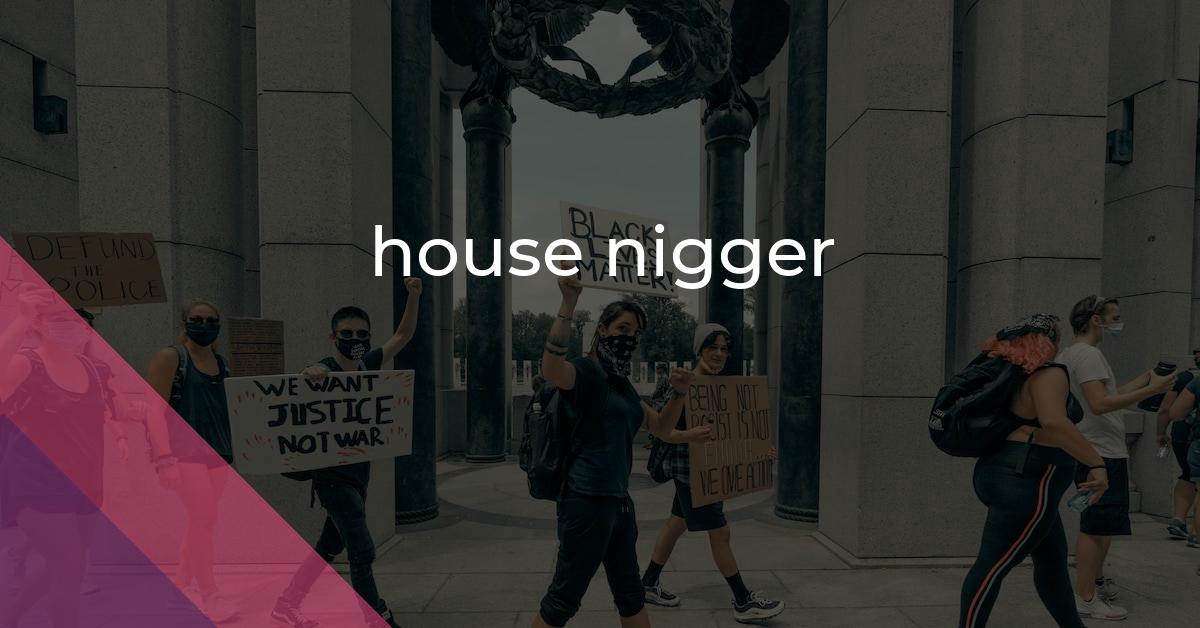house nigger: Idiom Meaning and Origin
What does ‘house nigger’ mean?
The idiom "house nigger" is an offensive term used to describe a black person who aligns themselves with white people, often gaining certain privileges or benefits as a result. Its origin dates back to the era of slavery when some enslaved individuals worked in the houses of slave owners.

Idiom Explorer
The idiom "keep house" refers to the act of managing and maintaining a household, typically done by a homemaker. It involves tasks such as cleaning, cooking, and organizing the home. The phrase can also imply maintaining order and harmony within the household.
The idiom "jerkoff" is a vulgar slang term used to describe someone who is considered foolish, stupid, or annoying. It is an insult that implies a lack of intelligence or worthlessness.
The idiom "housewarming" refers to a party or event where friends and family gather to celebrate and warm-up a newly built or moved-in house.
Meaning: Someone who spends a large portion of their income on housing expenses, leaving little money for other expenses or savings.
The idiom "house of ill fame" refers to a place, often a brothel, that is known for immoral activities and a bad reputation.
The idiom "house of God" refers to a religious building, usually a church, mosque, or temple, where people gather to worship and practice their faith.
The idiom "home away from home" refers to a place where one feels comfortable and at ease, as if it were their own home, despite being away from their actual residence.
The idiom "ghost home" refers to a property or house that is believed to be haunted or inhabited by ghosts. It implies that the place is empty or abandoned by living beings.
The idiom *ghetto lottery* refers to the perception that living in a disadvantaged neighborhood has a high likelihood of resulting in unfortunate events or circumstances, often related to crime or poverty.
Unveiling Origins: 'House Nigger''s Meaning
The idiom "house nigger" is a highly controversial and sensitive phrase. It originated in the United States during the era of slavery and has derogatory connotations. This term is composed of two parts: "house" and "nigger." The word "house" refers to a slave who worked and lived in the main house or mansion of a plantation owner, as opposed to those who worked in the fields. These house slaves were often given certain privileges and were perceived by some as having a higher status among slaves. However, it is crucial to understand that this term is deeply offensive and perpetuates racial stereotypes and discrimination.
The word "nigger" is a racial slur that was historically used to degrade and dehumanize individuals of African descent. It emerged during the era of slavery as a derogatory term employed by white slave owners and others to reinforce the inferior status and subjugation of black people. Its usage is considered highly offensive and inappropriate in contemporary society. The idiom "house nigger" represents a derogatory label assigned to a slave who was perceived to be too close to their white owners and potentially identified with their oppressors. This implies a sense of betrayal toward one's own racial or ethnic group, as well as a willingness to benefit from the privileges granted by the slave owners at the expense of other slaves.
It is important to note that the idiom "house nigger" is deeply offensive and perpetuates racial stereotypes and discrimination. Its usage is strongly discouraged and should be avoided in both formal and informal contexts. The idiom's historical context within the institution of slavery underscores the significance of understanding the power dynamics and systemic racism that it represents.
In contemporary discourse, the idiom "house nigger" may be used by some individuals to criticize others who are perceived to be betraying their own community or advocating for the interests of a dominant group at the expense of marginalized communities. However, its usage remains highly contentious and is almost universally condemned due to its racist origins and the harm it inflicts upon individuals and communities.
Now, let's explore some related idioms that are associated with the term "house nigger."
The first idiom is "farm nigger." This term, similar to "house nigger," can be seen as derogatory and racially charged. While less commonly used, it refers to a slave who worked primarily in the fields of a plantation. These individuals were often subjected to strenuous labor, harsh conditions, and fewer privileges compared to house slaves. Both "house nigger" and "farm nigger" highlight the hierarchy and divisions that existed within enslaved communities based on the type of work they performed.
Another related idiom is "house poor." This term is not racially based, but it shares a similar connotation of being trapped in a certain social or economic circumstance. "House poor" refers to a person or family who is financially burdened by the high costs associated with owning or renting a home. It suggests that a significant portion of their income is allocated towards housing expenses, potentially leaving them with limited financial resources for other necessities or goals. While the context of "house poor" differs from that of "house nigger," they both convey the idea of being limited or oppressed by certain circumstances.
The final related idiom is "house of ill fame." This phrase is an older term for a brothel or house of prostitution. It is associated with the illicit and morally questionable activities that take place within such establishments. While "house of ill fame" does not have a racial connotation like "house nigger," it shares a common element of being associated with a particular type of living or working environment. These idioms highlight different aspects of society and evoke different images, but they all demonstrate the power of language in shaping our understanding of people and places.
The idiom "house nigger" emerged during the era of slavery and has derogatory connotations. It represents a derogatory label assigned to a slave who was perceived to be too close to their white owners and potentially identified with their oppressors. The usage of this term is deeply offensive and perpetuates racial stereotypes and discrimination. While related idioms like "farm nigger," "house poor," and "house of ill fame" convey different meanings, they all reflect certain aspects of living and working conditions. It is important to recognize the historical weight and impact of such idioms while also striving for a more inclusive and equitable society.
Example usage
Examples of how the idiom "house nigger" can be used in a sentence:
- "She is often criticized for acting like a house nigger, always trying to please those in power."
- "He is referred to as a house nigger because he is seen as someone who aligns himself with the oppressors."
- "The term 'house nigger' is a derogatory phrase used to describe individuals who are seen as betraying their own community for personal gain."
More "Insensitive" idioms



